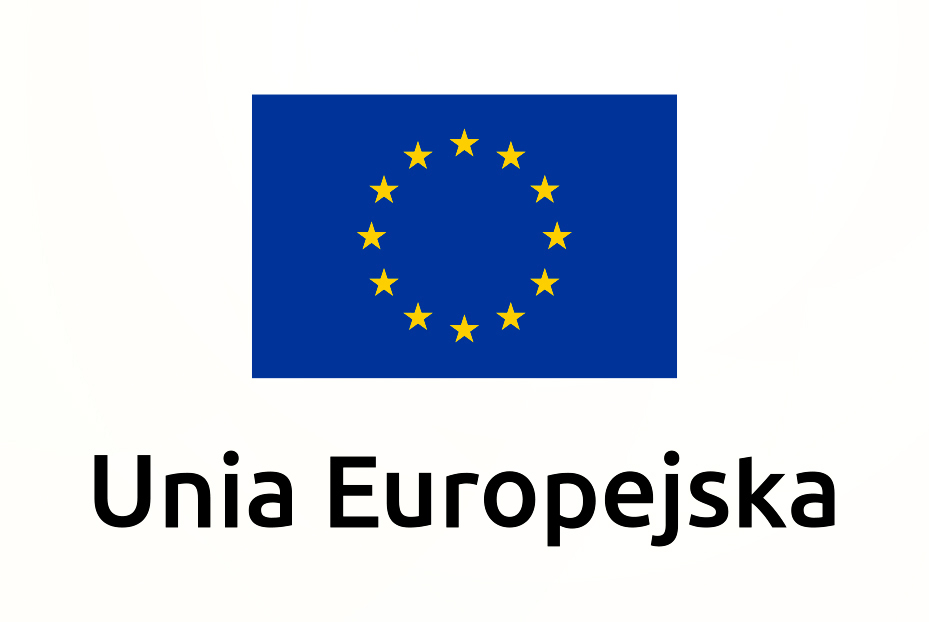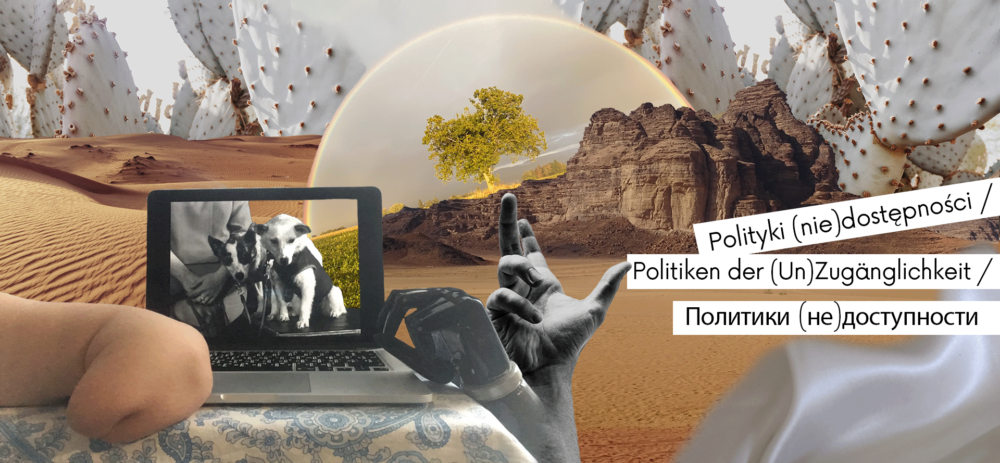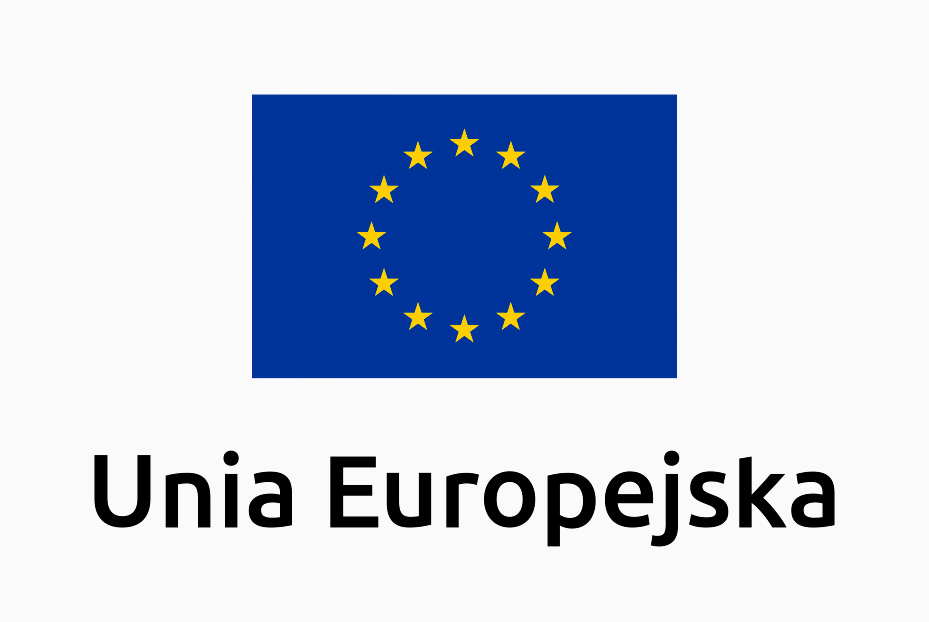[The graphic in gray-brown colors is a collage composed of layers. In the foreground there is a short arm, which ends 10 centimeters below the elbow. Next to it on a table stands a computer with a black and white image of two dogs, further, there is a prosthesis hand and an open human palm stretched upwards. To the right of the frame is the symposium title in three languages. In the background, there is a desert with rocks and cacti. Between the rocks and cacti grows a tree, over which a rainbow stretches.]
RU version: Политики (не)доступности - RU
GER version: Politiken der (Un-)Zugänglichkeit - Deutsch
During the first lockdown some people missed “normality”. But normality is also in a crisis, as it produces separation, isolation and infrastructures that continue to destroy our bodies and nature. The pandemic has once again shown: our lives are vulnerable, and some lives are more than others. The way out is to think space and time otherwise. We need more stories about practices of care and accessibility, about disabled artists and activists and their valuable and tireless (educational) work.
Accessibility has recently become crucial in the context of art. During the Covid-19 lockdowns, cultural institutions had to switch to remote programming. The online space has been flooded with discussion panels, 3D exhibitions and live-streamed performances. Audiences grew, people confined to their homes were able to remotely participate in cultural life, and speakers did not have to travel hundreds of miles by train, car, or aeroplane to attend a 1.5-hour-long meeting, leading to tangible benefits to the environment. However, few of these events were actually accessible to those with diverse individual needs: older people, children, and blind/visually impaired or deaf/ hard of hearing people, persons with learning disabilities etc.
How do we make public spaces, including art institutions, accessible to people with different needs, taking this into account from the very beginning, when it comes to architecture and communication? It is crucial to increase public awareness of these issues of exclusion and allocate substantial financial resources in order to implement change. For the time being, the responsibility for creating “habitable worlds”, to use Nancy Mairs’s term, rests on the shoulders of already marginalised people and precarious cultural and administrative workers, burdened with the responsibility of ensuring accessibility as part of their long list of duties. Accessibility cannot be viewed as a task to be completed in the so-called meantime. It should be our top priority, a political demand that puts into practice the constitutional right to equal treatment for all, including equal access to services and opportunity to shape common spaces. It is about criticizing power structures in institutions. As disability activist Alice Wong said “disability justice is simply another term of love”. Access means equal recognition of disabled people and changing of non-disabled people and their acting and thinking - in all spaces, including those already seeing themselves as critical. Curator Noa Winter (Berlin) writes that even non-disabled feminists forget to thank “those marginalized people who have developed this knowledge (about accessibility and digital access) with unbelievable effort and in a never-ending painful process, and who time and again convey this knowledge in mostly unpaid, emotional labour to ableist institutions and non disabled feminists alike”.
The international symposium “The Politics of (In)Accessibility” aims to explore different ways of working with accessibility by thinking together the situations of disabled activists and artists in the Polish, German and Russian contexts. The symposium comprises two events: a panel discussion, “Democratizing Accessibility” (presented in hybrid mode) and a webinar, “Art and Life in Extreme Circumstances” (online on the Zoom platform). The first will focus on the institutional reality: we will discuss the anti-ableist strategies of disabled artists and activists working or collaborating with institutions. The second meeting will take as its starting point the situation faced by the artist and activist Yulia Tsvetkova, who became a political prisoner of the Kremlin as a result of her emancipatory endeavours. Unfortunately, protection of human life is not guaranteed. While Yulia’s freedom is put under threat by the Russian state, in Poland feminist activists are taken to court for their protest against the ban of abortion. Everywhere, disabled persons in care homes and likewise institutions are at everyday risk of violence. In April 2021, four disabled persons were killed in a care home in Potsdam. In Russia, thousands of people cannot escape the walls of the “boarding houses” into which they are sent after turning 18. We will compare the Polish, Russian, and German contexts and consider what strategies can be employed in the face of systemic oppression, ableist structures and depoliticization of inclusion.
Ahead of the first panel, from the beginning of July until the end of August, we will be releasing videos by artists and activists, in which they contextualize living as those who do not conform to the physical, neurological and psychological imaginary “standards”, created by the colonial, heterosexist and ableist society. Most videos will include audio description and subtitles in Polish, Russian, German and English. The recording of the panel “Democratizing Accessibility” will be made available on Saturday 24 July. On the same day, the "Art and Life in Extreme Circumstances" webinar will take place. The registration for this webinar will be opened a week before on the 17th of July. You can find us on our website, YT channel and FB of Arsenal Municipal Gallery and on the website and in social networks of Feminist Translocalities.
During both meetings, panellists will use their everyday means of communication: Polish, Russian, German, and Polish Sign Language. The entire event will be translated into Polish and Polish Sign Language, with subtitles in Russian, German, or English added in post-production.
Participants of the symposium: Androgyne und Centaur, Anna Kilina, Alena Levina, Daniel Kotowski, Eliah Lüthi, Elżbieta Podleśna, Filip Pawlak, Karolina Wiktor, Katarzyna Żeglicka, Katrin Nenasheva, Kolektyw Nurkowy Bojka, Miriam Cochanski, Sofia Savina, Wiktoria Siedlecka-Dorosz, Vera Berlinova
Moderation: Kira Shmyreva, Zofia nierodzinska.
Technical support: Vica Kravtsova
Production: Monika Petryczko, Agnieszka Nawrocka, Michał Anioła
Translations: Irina Bondas, Victoria Kravtsova, Natalia Bucholska, Aleksander Gazarian, Renata Baranowska, Adam Peszke, Karolina Bocian, Marta Jaroń, Joanna Figiel
Audio descriptions: Vera Berlinova, Remigiusz Koziński, Fundacja Otwieramy Kulturę i Sztukę [We Open Art and Culture Foundation]
The event is supported by Stiftung für deutsch-polnische Zusammenarbeit, as well as German Foreign Office.
Graphic design: Magdalena Sobolska


